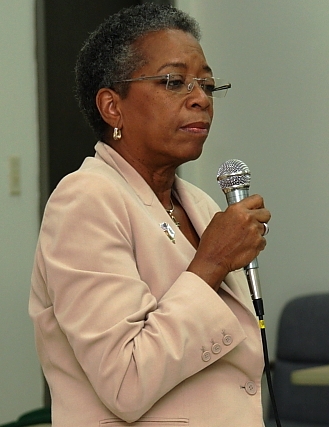
“To frame the issue in simple terms, my constituents and those of my colleagues equate the ACA (Affordable Care Act) or Obamacare with having an exchange,” Christensen said at the annual meeting of the Interagency Group on Insular Areas. “And well they should because the central premise and promise is affordable coverage for all Americans.”
The meeting was co-chaired by Interior Department Secretary Sally Jewel and White House Deputy Assistant to the President for Intergovernmental Affairs David Agnew. Christensen introduced Senate President Shawn-Michael Malone, who attended the meeting.
Gov. John deJongh Jr. was not able to attend, but earlier had presented a memorandum covering a dozen issues important to the territory for consideration by the group, headed by resolution of the rum tax cover-over rate extension.
Addressing the ACA concerns, Christensen told the group – which also included representatives from Commerce, Agriculture, Energy and other federal agencies whose policies impact the Virgin Islands – that “to be eligible without equitable and adequate funding is not to be included at all.”
“All of us have significant segments of our population who today have no possibility of getting health insurance, and the delegates are asking for fairness to prevail and that our districts be allowed to participate in the federal exchange.”
Paul Dioguardi, director of Intergovernmental Affairs for Health and Human Services, said they were working to make sure the territories can participate to the full extent allowed by current law. He pointed to a recent increase in the Federal Medical Assistance Percentage, which would cover more of the uninsured in the Virgin Islands and other territories, and said Guam has already submitted the necessary documentation to take full advantage of the increases.
Christensen said that with all the HHS and CMS help, there were still more than 30,000 uninsured people in the Virgin Islands.
“I still have to find a way to provide insurance for everyone,” she said.
DeJongh had been in the nation’s capital to discuss the rum cover-over extension but had to fly back to the territory before Tuesday’s meeting, so he submitted a memorandum outlining what he said were critical issues facing the territory.
“I had an opportunity to discuss a majority of these areas with acting Assistant Secretary Faeth and Director Nik Pula at our meeting on the rum cover-over last Friday and used that opportunity to provide an even more comprehensive perspective as to their impact on our residents," deJongh wrote.
In his memorandum, deJongh listed 12 areas of "critical importance to the economic development and fiscal independence of the Virgin Islands, for the IGIA and on-going interaction with the Department of the Interior."
Under the heading of "Tax Issues," the list included the rum tax cover-over rate extension, the Rockefeller Amendment/Treasury Regulations that pertain to amending residence and sourcing rules for possessions, revising the treatment of capital gains, and earned income credit cost sharing.
For "Healthcare," the governor included the extension of Medicaid "J" waiver authority to all U.S. territories, which would provide flexibility in meeting legal and administrative requirements of the ACA, the extension of state-like Federal Medical Assistance Percentages to all territories, and inadequate Medicare reimbursement for Virgin Islands hospitals under the outdated Tax Equity and Fiscal Responsibility Act of 1982.
DeJongh listed three issues under "Homeland Security." They are a proposed special visa waiver program for the U.S. Virgin Islands that would lead to increased tourism and opportunities for hosting international special events, support for full federal funding of customs services in the Virgin Islands, and expansion of the Caribbean Basin Security Initiative to include the U.S. territories in the Caribbean, or establishment of a comparable program with similar financial resources and programs.
For "Early Education," the governor listed inclusion of the U.S. territories in President Obama’s Plan for Early Education for all Americans.
The 12th issue, under "Transportation," is an appeal to restore the 20 percent funding cut to the territorial highway program.
"The issues have not necessarily changed over the years, but resolution is more critical to us in order for the Virgin Islands to be competitive regionally, ensure quality of life issues and attain financial sustainability that can lead to so many other benefits on behalf of our community," deJongh said Tuesday.
The IGIA was established in 1999 to provide a mechanism for improved communication and coordination between the federal government and its territories.





